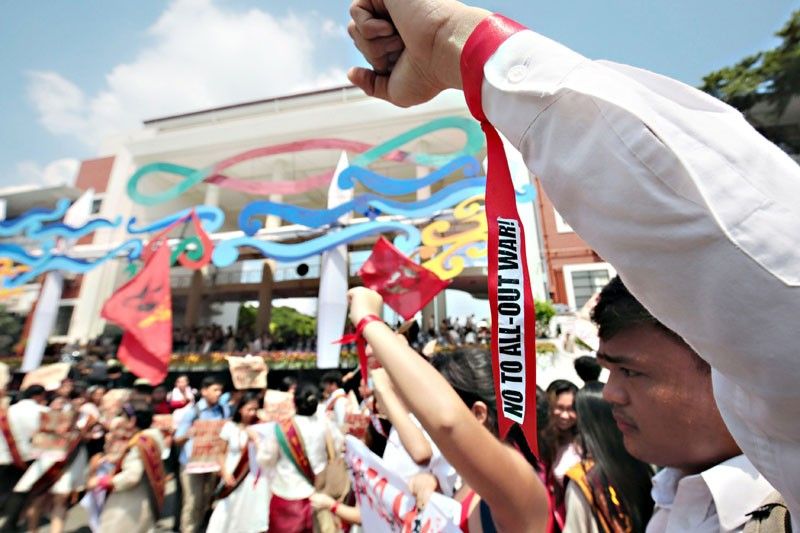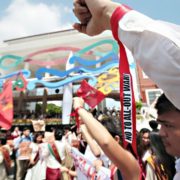
SEVERAL universities in Metro Manila on Thursday, October 4, dared the Armed Forces of the Philippines (AFP) to prove its accusations that their institutions are breeding grounds for the Communist Party of the Philippines (CPP) and the New People’s Army (NPA). and recruits for a destabilization plot against President Rodrigo Duterte.
Joseph Noel Estrada, legal counsel for Philippine Association of Private Schools, Colleges and Universities (PAASCU) and the Coordinating Council of Private Educational Associations of the Philippines (COCOPEA), said that the release of the list without any solid proof or evidence is irresponsible and reckless.
The military claimed that the CPP is trying to incite students to rebel against the government through the film showing activities that depict the dark years of martial law during the Marcos dictatorship.
“It should be rectified immediately. It puts all students in these colleges and universities at risk because they are now perceived as possible communists or rebels,” Estrada said as reported by The Philippine Star.
Estrada, who is also employee of Emilio Aguinaldo College (EAC), said that the college vehemently denies the allegations of the Armed Forces of the Philippines (AFP) that it is being used by the Communist Party of the Philippines (CPP) for recruitment of students.
“EAC and its students have no record of participation in any partisan political activity and, in fact, are known to be more involved in outreach and community programs because of its medical and allied health courses,” the statement read.
“Absent any proof or factual basis, the statement made by the AFP should be rectified immediately. Such statement undermines the safety and security of the students of EAC as they are now looked upon as possible communists or rebels,” it added.
Other tagged universities also stood by their resolve and issued several statements against the AFP’s red list.
De La Salle University (DLSU) president Armin Luistro said it was obvious that the universities were just showing films about martial law in time with the commemoration of its declaration last September 21.
“There is nothing wrong in a university setting where many ideologies are discussed. Connecting that with an actual plot to overthrow the government is an entirely different matter,” he said in an interview with ABS-CBN News Channel the same day.
“It’s a created fear. They’re creating a scenario that’s not even there by talking about the supposed ‘Red October’ plot. And to me, that’s the scary part. If your official intelligence group talks about that scenario, I think they have a modus that’s out of the usual,” he added.
Far Eastern University (FEU) also said that its administration is in no way “promoting or condoning any on-campus movement to destabilize the government.”
University of Santo Tomas (UST) secretary general Jesus Miranda, in a report by student publication The Varsitarian, said that the “AFP should first provide proof before dragging the university into its claims.”
“Maybe they are just stereotyping or because we are a Catholic university and there is a perception that we are against the present government. Is that why we are being tagged?” he said.
University of the Philippines (UP) vice president for public affairs Jose Dalisay Jr. earlier declined to comment on the matter, saying university officials have yet to see the report of the military on which the allegations were based. However, student regent Ivy Taroma warned that the list could endanger students in the universities.
University of Makati president Tomas Lopez said that its management has no knowledge of any student activity linked to the AFP claims.
“While we protect the rights of our students to free speech and assembly, we also strongly adhere to the principles of democracy as enshrined in our Constitution,” he said.
“Our student development efforts are centered on providing them programs that will strengthen their employability and readiness for work after graduation. As a local academic institution, we do not participate in any partisan political initiatives, but rather, we focus on efforts to strengthen the value of citizenship in young Filipinos so they can become productive members of our society,” he added.
According to the Commission on Human Rights (CHR), showing of films about martial law should not be deemed subversive. CHR spokesperson Jacqueline de Guia noted that the AFP could be in violation of the student’s rights.
“The commission is alarmed by the release of the AFP of the list of universities allegedly involved in CPP recruitment,” De Guia said.
“This blanket act of red-tagging endangers students and the youth and it may give the AFP a license to arbitrarily infringe on the freedom of expression, the right to petition the government, as well as to assembly,” she added.
Military sets talks with schools
The AFP and the Philippine National Police (PNP) said that they would seek a dialogue with top officials of colleges and universities regarding the allegation.
Gen. Carlito Galvez Jr. said the AFP would hold talks with the Department of Education (DepEd) and the Commission on Higher Education (CHEd), while PNP Chief Oscar Albayalde said they would help straighten facts.
“We are not going to condemn but we want to help them in teaching what is right and what really is happening. It’s all part of the education and to know the whole picture because it is dangerous if they don’t get that from their teachers and schools who are considered as second parents,” he said as reported by the Manila Times.





